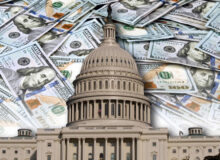Televised presidential debates have become such a part of the fabric of campaigns that many assume the John F. Kennedy-Richard Nixon debates of 1960 began an uninterrupted string. But after their debates, 16 long years passed before the next battle occurred between a Republican and Democrat candidate.
≈
Before the Kennedy-Nixon debates, no presidential candidates in a general election had debated on radio or television. There had been primary season debates but never an inter-party version in the autumn.
≈
It is part of political lore that Nixon suffered, due to his perspiring look in the first of those 1960 debates, compared with the youthful Kennedy, as the TV cameras harmed Nixon. The shorthand narrative is that Nixon, unaware of the relatively new medium of television, declined to wear makeup.
≈
There’s more to the story, however.
≈
Largely forgotten is that Nixon had been hospitalized for two weeks in August when he planned to be campaigning. This occurred after he banged his knee departing a car at a North Carolina event and developed a serious infection. So, while Kennedy was introducing himself to voters around the country, Nixon was in a hospital bed; footage of the Californian in his pajamas, being visited by President Dwight Eisenhower, did not play well against film of the salubrious Kennedy working crowds.
≈
By the time Nixon left the hospital, he was weakened and had the flu when he arrived in Chicago for that first debate and had lost considerable weight. His pale appearance resulted from his health problems as much as anything else.
≈
Nixon lost by
razor-thin margins, and in 1964, with Barry Goldwater as the Republican candidate, incumbent Lyndon Johnson decided there was no reason for him to debate. Ahead in the polls, LBJ believed that a debate would not help him but could certainly hurt him if he did not do well. Johnson declined to participate.
≈
Another factor hindered presidential debates in the 16 years after Kennedy-Nixon: The Federal Communications Commission’s equal-time provision, which mandated the inclusion of all candidates. So, the major candidates could use the dubious provision as an excuse if they preferred not to debate.
≈
In 1968, Hubert Humphrey wanted to debate Nixon, but Nixon said no. And in 1972, when the incumbent Nixon dominated the polls, he did not debate radical George McGovern.
≈
By 1976, President Gerald Ford, having entered office after Nixon resigned, agreed to debate Jimmy Carter. In one debate, Ford said, “There is no Soviet domination of Eastern Europe,” a misstep that likely changed the election.
≈
Even post-1976, some candidates skipped presidential debates. 1980 Carter did not participate in the first one because independent candidate John Anderson was included. Carter’s opponent, Ronald Reagan,
showed up to debate Anderson and went on to win the election.
≈
Debates today between the presidential candidates – even when one is the incumbent – seem mandatory. A candidate would be seen as cowardly for not agreeing to debate.
≈
But Biden, whose
intellectual abilities have atrophied, refused to debate his
zany primary challenger, and Trump, realizing his supporters are unlikely to hold him accountable, chickened out of primary debates. If these two unpopular octogenarians are indeed party nominees, I see little chance they will face off on stage next fall.






